"All my best Deaths": Interview with Dante Buu
20/04/2021
"All my best Deaths": Interview with Dante Buu
Mine Kaplangı, February 2021
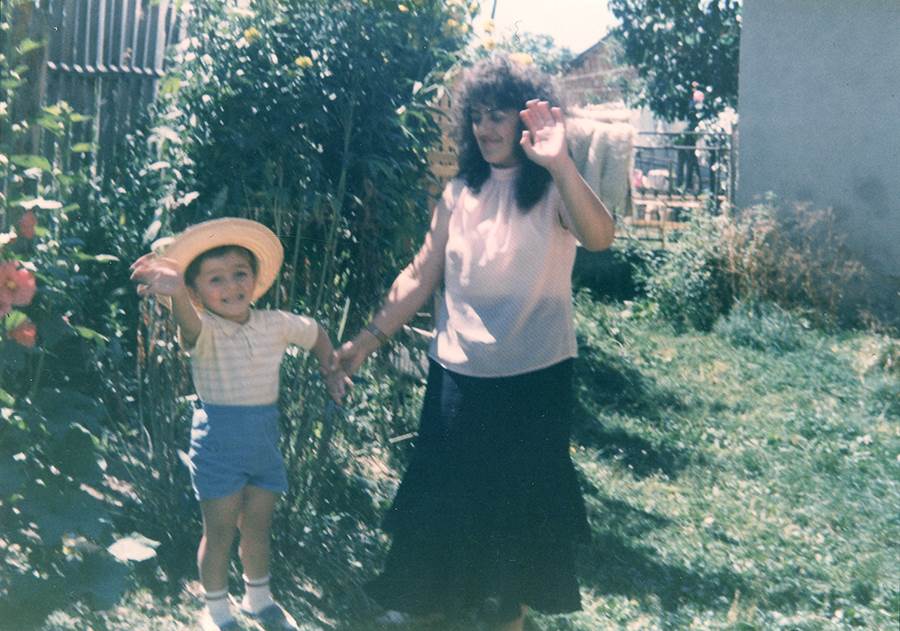
Dante Buu, THEY WILL COME FOR US, MY BEAUTIFUL GIRL, 2020, scanned photograph, billboards, posters, postcards – dimensions variable
(Photograph of Dante Buu with his Mother, taken by an Unknown Photographer, ca. 1991)
MINE KAPLANGI: It will help us start to know that you are currently in your hometown Rožaje (Montenegro) and getting prepared for a year-long journey in Berlin. And also you currently being a participant of the Ankara Queer Art Residency but not being able to travel/visit there due to the pandemic. How are you feeling in general? And how did you spend the lockdown in your hometown? And lastly, what kind of an effect this period has on your practice?
DANTE BUU: It is a rollercoaster of emotions, moving me between low and high all the time. The first lockdown found me in Zagreb, and probably like everyone else it took me by surprise. I was attending the WHW Akademija residency, the people that lead the programme made me very unhappy and unwanted, and in all that mess there was a terrible earthquake in Zagreb. From there, I somehow made it to Montenegro where I was in state quarantine for 14 days in Igalo. I had the most beautiful view of the open sea, but was locked in a room guarded by the soldiers, and from there I travelled to Rožaje for an additional 14 days of self-isolation. This image of me arriving at the front door of my home, and being so afraid to hug my Mum still haunts me. With time it got better, my family healed me; but I believe in all of us there is now an irretrievably nibbled part. During the several lockdowns, curfews and self-isolation I was working on the renovations in my Studio in Rožaje, and just as it was put together the call for Berlin came. The arrival to Berlin started with a quarantine too. My practice used to be bound to experiences, meeting people, stories they tell… and now… well I am still to make the first work after or rather during the situation we are in. “How it was before”, reflecting on this, I feel it is like bidding adieu to a lover whom you love very very much, but you know it is time to move on.

Dante Buu, Self–Portrait / Winter (Fifth Season), 2016 Hand-embroidered cotton thread on stramin 22.5 x 79.5 cm, unframed
MK: On our first zoom chat, you said besides being an artist, you are also a storyteller. Could you let us know why you mention storytelling as a base methodology and how it manifests itself in your practice?
DB: I am always amazed with the inequality that runs in our societies, especially in terms of who is important and who is not. Of course, this distinction is connected to privilege, money, power… and every day we learn something bad about people that are idolized (mostly men), about the abuse that was and is still taking place. The value system is rigged, misconstrued and a lie. Storytelling, as part of my artistic practice, for me is especially important as it is a fantastic way to speak up or rather make visible people and their lives, that are otherwise in the eyes of the “God of Big Things” unacceptable. Storytelling for me started while I was making my artwork Fifth Season (2014-2018); it is composed of a performance, four abstract handmade embroideries and four stories that I wrote. The stories are based on the present and the past, memory, real events and fiction from my life and the lives of my grandmother, my mum and my three aunts. It all started with the gobelins, Four Seasons, which are still hanging on the wall in the living room of my parents' house which were always a hot topic among my mum, her sisters and her mother. Actually, the Four Seasons were part of the dowry of my youngest aunt, but due to her immigration to Sweden, she left them behind, and my mum took them. I am not sure if my late grandmother ever got over that fact. Dowry played such a significant role in her upbringing. Back when she got married, it was the custom for a bride to open her hope chest, lay out all of the handmade objects in the garden and hang them on the plum trees for the whole village to see how skillful she was. The stories of Fifth Season take us through different historical events, social conditions and private relationships. And in this year, the book “Fifth Season” will be published by Archive Books Berlin. I was so lucky to collaborate on it with genuine and loving people, among others, Derya Yücel, Stanimir Panayotov, Adela Demetja, Georg Schöllhammer and Rabih Alameddine.
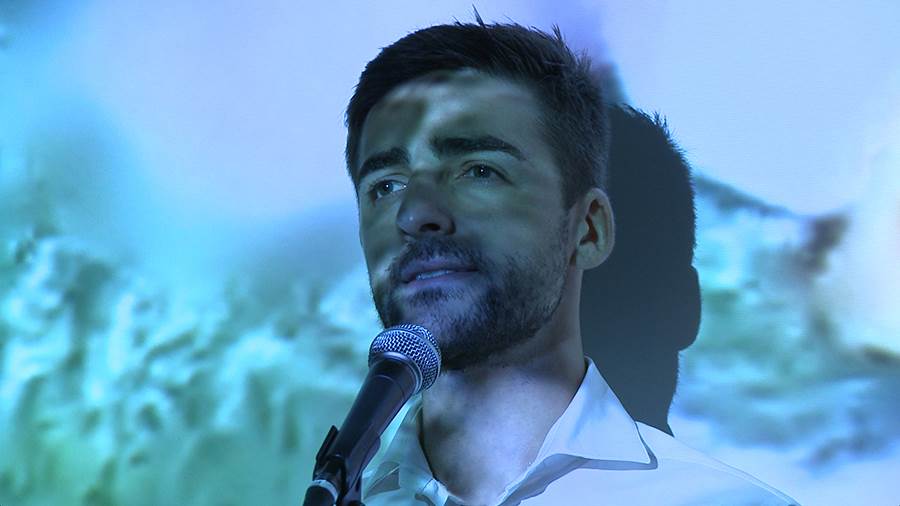
Dante Buu, The Winner Takes It All, 2015, Video still from performance documentation at < rotor > Centre for Contemporary Art, Graz
MK: The performative element in all your works is quite dominant. Yet, because of what this pandemic left with us, I cannot stop thinking about the relations between experiencing/watching a performance, physical intimacies and how this will affect our perception, especially on live art performances. How did you start doing live and public performances?
DB: I constantly move between the desires “to be known” and “be unknown”. Since I can remember, attention was always directed towards me, mostly for all the wrong reasons: the way I behaved, the way I dressed, my sexuality and so on. But as we have established all this misguided attention is based on a system that is fucked up, discriminatory and rigid. Therefore, in order to change the system (counting all the bad systems that form The System) one must step into the limelight. Speak out. Resist. I did my first performance in autumn of 2014 titled A Portrait of my Parents / Summer (the first of four pieces that compose my artwork Fifth Season). The summer that moved me towards A Portrait of my Parents / Summer was one of the most difficult summers in my life. My Dad fell down from a sweet cherry tree and broke his spine. My first encounter with this terrible thing that had happened was in the hospital room where I saw my mother sitting at the foot of my father’s bed waiting for him to wake up after surgery. It was one of those times or moments in which you realise where the border, after which you are powerless, is. I could only stand and observe... waiting. The same waiting that I shared with my mum, that protracted and endless waiting for a miracle to come. A significant part of the dowry were the handmade objects that future brides would make from an early age; in their work, the young girls would embroider their hopes and dreams about the future life. And, there I was in a hospital room, standing and looking at the two people who created me, unable to do anything to help them. I was reflecting in them as they reflected in me, so I took a needle, a black silken thread and a white stramin. I started to create them with embroidery. Performativity in this situation was used to accent that prolonged waiting, it took me over four years to finish this piece and over two thousand metres of thread to fill the white stramin with the black, silken embroidery. While traditional dowry pieces were copy-paste motifs with small variations, my embroideries rather take the path of abstraction. They do not suffer from the traditional in any way, most obviously breaking from the form of a “skill passed from mother to daughter”, as the dowry was exclusively a female domain.
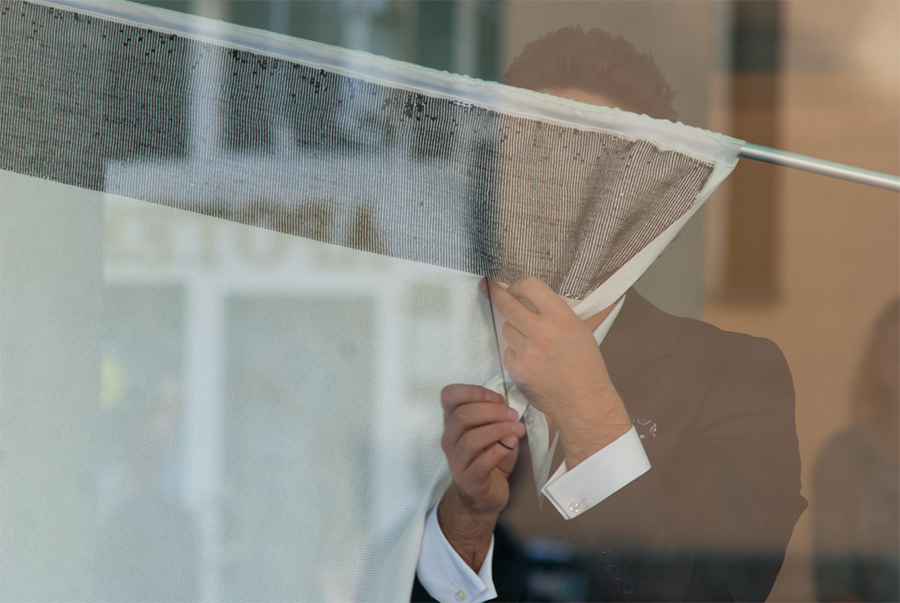
Dante Buu, A Portrait of My Parents / Summer (Fifth Season), 2014, Photo documentation of the performance at Gallery JAVA, Sarajevo, photo; Aleksandar Kordić
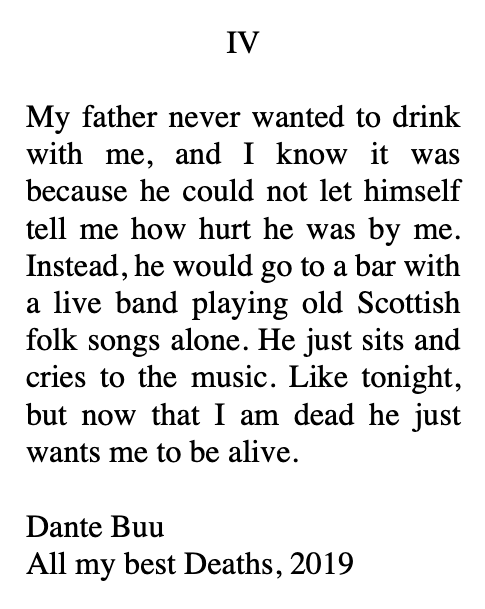
MK: Having said that right before we met on Zoom, I watched your performance All My Best Deaths (2019) as part of the performative exhibition NEXUS 1, in the framework of TBA Festival (PICA) in Portland. Could you tell us more about this performance and your experiences during the NEXUS 1 project?
DB: All My Best Deaths was conceived, developed and realized with my dear friend curator Adela Demetja who created the NEXUS 1 (a performative exhibition that involved several artists whose contributions created a unity). This was the first time that I collaborated with someone from the very start until the very end. It is one of the most beautiful, loving and professional collaborations that I have done until now. Adela is someone that I trust, and for me trust is very important. It is funny how very few people there are, who are honest and real in the art world, who do not have hidden agendas and do not push only their personal gain to the forefront. For All My Best Deaths, I wrote seven stories based on encounters with people from different backgrounds, each dealing individually with a version of social death. The stories are narrated by myself, while I embroider the white thread on a white fabric framed by a video installation. I used my voice before, for instance when I sing in my performance piece The Winner Takes It All (2015), but All My Best Deaths was the first time I paired my voice with embroidery. This was actually Adela’s idea, to which I was very hesitant at first, I must admit, but it turned out to be one of those glorious pieces of advice that made the artwork whole and created a completely new experience for me and the audience. And Portland… Portland was absolutely fabulous, we worked really hard, but also, we ate fabulous food, had fabulous nights out, all in all one of those beautiful periods in life that you take with you forever privately and professionally.
Dante Buu, Weekend Lovers, 2013 ongoing, Behind the Scenes
MK: What keeps you busy nowadays? You mentioned how you read a lot, but I wonder what have you been reading, thinking and working on in these days.
DB: These days I keep myself busy with my upcoming exhibition at Künstlerhaus Bethanien for which I am preparing a new performance piece and will show as well my ongoing video installation Weekend Lovers II (2013), the book “Fifth Season,” the preproduction of my first short movie and conceptualization of my artwork for Ankara Queer Art Residency. So, a lot is happening, but there is always time for books. Reading and books were always an escape for me. A protection. As a child, I was always excluded from society, which has not changed much now that I am grown, and the books and stories were always safe havens. As far as I remember I was barely 14 years old when I read, for example, everything from Dostoyevsky. At the moment, I am flowing between E. L. James’s “Fifty Shades of Grey”, Wolfgang Herrndorf’s “Arbeit und Struktur” and Shoshana Zuboff’s “The Age of Surveillance Capitalism”. My mind is preoccupied with what art means for me, how the structure or rather the hierarchy of the art world is corrupt and abusive: where do I fit in, if at all? Do I even want to fit in at all?
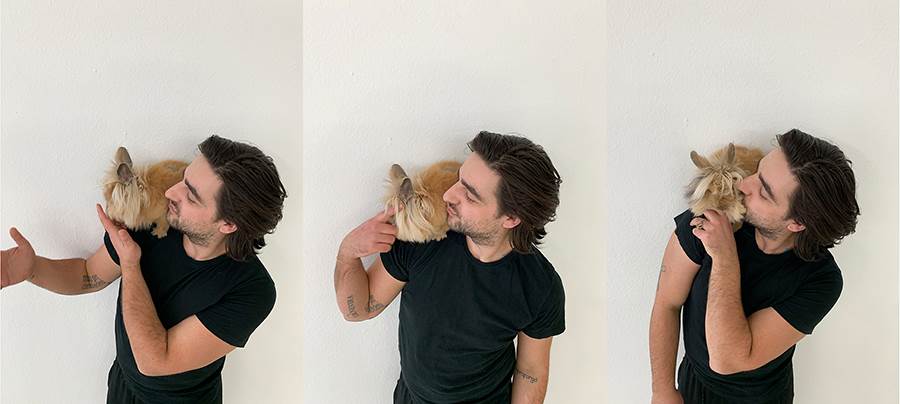
Bobby & Dante Buu, Berlin, February 2021, photo: Vanja Prokić
MK: During our zoom conversations, you mentioned Bobby a lot, could you let us know about Bobby? (This part of the interview was conducted after the artist's relocation to Berlin.)
DB: Bobby is babe. A saviour. A love. Bobby is my bunny. A Lionhead. When Bobby entered my life, four months ago, I was pretty much a wreck. It is 04:03 AM in Berlin at the moment and I am listening to Antony and the Johnsons’s “Fistful of Love”, Bobby is lying next to my feet. Completely calm. Maybe Bobby is sleeping. I am not really sure. Ever. I guess it doesn’t matter, I know that he is calm, and I am calm. When Bobby first came to me I realized that “there is goddess” and I turned towards veganism. As I never had pets before, I was so very much surprised by the healing powers animals have, and the innocence they carry within them. I spoiled Bobby a lot, so much that, the other night when my beloved friend and the creative director of my studio Roxanne was visiting, Bobby bit her (twice) and pissed (three times) on the sofa she was sitting on out of jealousy. Roxanne forgave Bobby, and the sofa is just a material thing that doesn’t carry any significant meaning (except those of misguided status symbols). Bobby is alive and sofa is dead. I hope we will start, especially in the post-pandemic stage of Covid-19, to value life more than we value things.
MK: Lately, I have been rethinking our relations with our environments in the cities we live in and how our daily rituals and secret corners are drastically changed, forgotten or protected. Is there any particular place or a memory of a place you want to mention/share about our hometown?
DB: The relationship that I have with my home town is, to put it mildly, very complicated. Growing up was not easy for me, as I loved Lambada skirts and Barbie dolls, the kids in my town called me names, beat me and excluded me from their company; it was not just the kids, it was the grown-ups too. My most difficult memory from my childhood is when, for the first time, my first neighbour invited me to the party for her seventh or sixth birthday, I was beyond myself with happiness. In the middle of the party her mother came and took me out in front of their apartment to tell me, “if you don’t stop laughing so loud, I will throw you out, you are bothering the man of the house.” Her parents, like many other parents, forbade their children to be my friend, as I was “like a girl.” So, I was alone from that side, and my beautiful parents did everything in their power to make me happy. I know that the love of my parents, for me, saved my life. I was laying in my mother’s lap, crying and wanting to die, to end it all, yet I could feel in her palm on my forehead all the love that would heal my broken heart. So, I did not. Even to this day, now as an adult, the situation in my hometown, my country and region has not changed much for me, but my home is my home. The only place where I feel absolutely loved and accepted.
-------------
Dante Buu (Rožaje, Montenegro) is an artist, storyteller and performer.
His autobiographical work, intertwined with the lives of others, invites us on journeys of love and resistance. Spanning from embroidery and text to video, film, photography and performance, Dante’s world is a voice for the non-normative. As the only artist from a Muslim background to ever come out as gay publicly in the Balkans, Dante is a pioneer freed from the suffering of form and thus paves the way for generations to come.